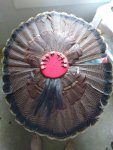Son
Gone But Not Forgotten
Trip from Lake Seminole to Albany Ga yesterday shocked me. The plantations along 91 were burning their woods. During quail and turkey nesting season? I know the birds are nesting in Miller and Early counties now and I wouldn't burn the woods off. Maybe those plantations use the put and take quail hunting method. Just last week a fellow who lives next to the Silver Lakes management area said. DNR traps turkeys there to relocate to other areas of the state. Hope they aren't putting them on those plantations.

